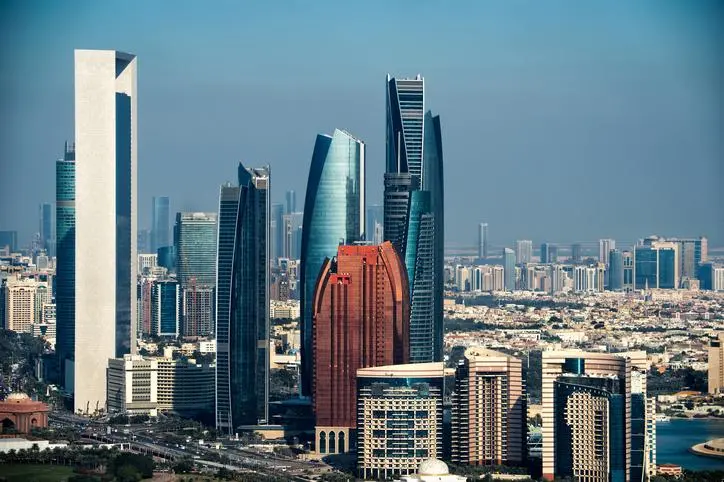PHOTO
Abu Dhabi's 50 billion UAE dirham economic stimulus package announced on Tuesday evening is "a clear positive" for the emirate's non-oil outlook, according to one economist.
The stimulus package was announced by Abu Dhabi's Crown Prince on Twitter late on Tuesday evening, although the details have yet to be ironed out.
The Crown Prince said that the three-year package would "support Abu Dhabi’s economic development", adding that the emirate's executive council had been tasked with drawing up a plan of how the money would be allocated within 90 days.
“We see the announcement as a clear positive for Abu Dhabi’s non-oil growth outlook," Bilal Khan, a senior economist at Standard Chartered bank said in an email to Zawya.
"At 50 billion UAE dirhams ($13.6 billion) over three years, the spending would amount to around 2 percent of Abu Dhabi’s GDP each year – significant in scale. Although the eventual economic impact will depend on spending allocation decisions that are to be taken over the next three months, job creation appears to be a central focus. This, we think, is likely to support consumer sentiment over the next couple of years.”
Monica Malik, chief economist at Abu Dhabi Commercial Bank, told Zawya in a phone interview that the size of the stimulus equated to about 6 percent of the emirate's non-oil GDP.
Although the bank does not publish a GDP forecast solely for Abu Dhabi, its current forecast is for non-oil growth in the UAE to reach 2.8 percent this year - up from 2.6 percent in 2017.
"Until we get more details, we won't change our forecasts," Malik said."We already have overall UAE non-oil GDP growth picking up and that's partly due to a more expansionary fiscal position in Abu Dhabi. We've seen investment - especially in the hydrocarbon sector - pick up this year and the higher oil price is likely supportive of that."
Abu Dhabi's economy suffered as a result of the decline in oil prices which began in 2014, when Brent crude more than halved from above $110 per barrel down to below $50.
Oil and gas firms, the emirate's banks and airline Etihad Airways were among the firms who began layoffs, which led to a weakening of demand for property and other services.
However, oil prices have steadily been climbing since the start of this year, standing at $75.69 per barrel by 0101 GMT this morning, which is above the $71.50 per barrel level that the International Monetary Fund last month said that the United Arab Emirates needs for its budget to break even.
Tim Fox, chief economist with Emirates NBD, said: “Higher oil prices have provided more room for governments in the region to boost spending, and the UAE is particularly well placed with respect to its budget – we anticipate a close-to-balanced consolidated budget this year after the new spending measures are taken into account."
He added in an emailed statement that Sheikh Mohammed Bin Zayed's announcement "also support(s) our view that non-oil sector growth in the UAE will be driven by government spending this year".
Alongside the direct financial impetus, Sheikh Mohammed bin Zayed announced other economic initiatives including an instruction for government payments to private sector firms working on contracts to be accelerated, and for new business licences to be exempted from having a physical presence in the emirate for two years.
He also instructed a dual licence regime to be implemented for firms operating in free zones to allow them to work outside free zones and pitch for government contracts, for the setting up of a new 'Abu Dhabi Accelerators and Advanced Industries Council' and for at least 10,000 public and private sector jobs to be created for Emiratis.
Jassim Alseddiqi, CEO of Abu Dhabi Financial Group, praised the plan "to diversify and grow the economy and improve the standards of living for Emirati nationals, residents and investors".
"The stimulus will help invigorate the economy through job creation and increased partnerships between the public and private sectors,” he said in an emailed statement.
Further reading:
- Abu Dhabi, Qatar among top five global real estate investors- report
- Inflation to rise alongside oil prices in UAE
- UAE current account surplus surges to $26.4bln
- Abu Dhabi FDI surges to $29bln in 2017
- UAE's ADNOC may sell more of distribution business -sources
(Reporting by Michael Fahy; Editing by Mily Chakrabarty)
Our Standards: The Thomson Reuters Trust Principles
Disclaimer: This article is provided for informational purposes only. The content does not provide tax, legal or investment advice or opinion regarding the suitability, value or profitability of any particular security, portfolio or investment strategy. Read our full disclaimer policy here.
© ZAWYA 2018





















